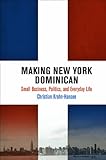Making New York Dominican : Small Business, Politics, and Everyday Life / Christian Krohn-Hansen.
Material type: TextSeries: The City in the Twenty-First CenturyPublisher: Philadelphia : University of Pennsylvania Press, [2012]Copyright date: ©2013Description: 1 online resource (320 p.) : 2 illusContent type:
TextSeries: The City in the Twenty-First CenturyPublisher: Philadelphia : University of Pennsylvania Press, [2012]Copyright date: ©2013Description: 1 online resource (320 p.) : 2 illusContent type: - 9780812244618
- 9780812207545
- Dominican Americans -- Economic conditions
- Dominican Americans -- New York (State) -- New York -- Economic conditions -- 21st century
- Dominican Americans -- New York (State) -- New York -- Politics and government -- 21st century
- Dominican Americans -- New York (State) -- New York -- Social life and customs -- 21st century
- Dominican Americans -- New York (State) -- New York -- Economic conditions -- 21st century
- Dominican Americans -- New York (State) -- New York -- Politics and government -- 21st century
- Dominican Americans -- New York (State) -- New York -- Social life and customs -- 21st century
- SOCIAL SCIENCE -- Anthropology -- General
- Small business -- New York (State) -- New York -- History -- 21st century
- Small business -- New York (State) -- New York -- History -- 21st century
- Folklore
- SOCIAL SCIENCE / Anthropology / General
- Anthropology
- Business
- Folklore
- Linguistics
- Sociology
- Urban Studies
- 305.896872930730747
- online - DeGruyter
- Issued also in print.
| Item type | Current library | Call number | URL | Status | Notes | Barcode | |
|---|---|---|---|---|---|---|---|
 eBook
eBook
|
Biblioteca "Angelicum" Pont. Univ. S.Tommaso d'Aquino Nuvola online | online - DeGruyter (Browse shelf(Opens below)) | Online access | Not for loan (Accesso limitato) | Accesso per gli utenti autorizzati / Access for authorized users | (dgr)9780812207545 |
Frontmatter -- Contents -- Introduction -- Part I -- Chapter 1. From Quisqueya to New York City -- Chapter 2. Origin Stories -- Part II -- Chapter 3. From Bodegas to Supermarkets -- Chapter 4. From Livery Cabs to Black Cars -- Part III -- Chapter 5. Dominicans and Hispanics -- Chapter 6. Up Against the Big Money -- Chapter 7. In Search of Dignity -- Conclusion -- Notes -- References -- Index -- Acknowledgments
restricted access online access with authorization star
http://purl.org/coar/access_right/c_16ec
Large-scale emigration from the Dominican Republic began in the early 1960s, with most Dominicans settling in New York City. Since then the growth of the city's Dominican population has been staggering, now accounting for around 7 percent of the total populace. How have Dominicans influenced New York City? And, conversely, how has the move to New York affected their lives? In Making New York Dominican, Christian Krohn-Hansen considers these questions through an exploration of Dominican immigrants' economic and political practices and through their constructions of identity and belonging.Krohn-Hansen focuses especially on Dominicans in the small business sector, in particular the bodega and supermarket and taxi and black car industries. While studies of immigrant business and entrepreneurship have been predominantly quantitative, using survey data or public statistics, this work employs business ethnography to demonstrate how Dominican enterprises work, how people find economic openings, and how Dominicans who own small commercial ventures have formed political associations to promote and defend their interests. The study shows convincingly how Dominican businesses over the past three decades have made a substantial mark on New York neighborhoods and the city's political economy.Making New York Dominican is not about a Dominican enclave or a parallel sociocultural universe. It is instead about connections-between Dominican New Yorkers' economic and political practices and ways of thinking and the much larger historical, political, economic, and cultural field within which they operate. Throughout, Krohn-Hansen underscores that it is crucial to analyze four sets of processes: the immigrants' forms of work, their everyday life, their modes of participation in political life, and their negotiation and building of identities. Making New York Dominican offers an original and significant contribution to the scholarship on immigration, the Latinization of New York, and contemporary forms of globalization.
Issued also in print.
Mode of access: Internet via World Wide Web.
In English.
Description based on online resource; title from PDF title page (publisher's Web site, viewed 24. Apr 2022)


